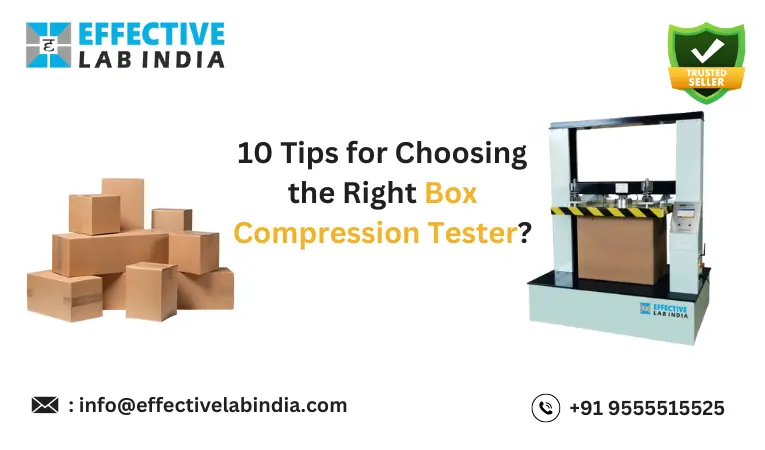Making sure that boxes are strong and long-lasting is important in shipping and packaging. Box compression testers are useful in this situation. These tools assist producers and quality control experts figure out the maximum weight a box can support before collapsing or deforming. Selecting the appropriate box compression tester is crucial for precise outcomes and streamlined processes. But how can you choose wisely when there are so many possibilities available? Now, look at 10 useful suggestions to get you the best box compression tester for your requirements.
Understanding Effective Lab Box Compression Testers
A specialised testing instruments called a box compression tester is used for measuring the packing boxes’ compressive strength. It provides information about a box’s load-bearing capability by applying an accurate level of pressure on it until it breaks or deforms. Manufacturers need to know this information to make sure their goods can survive the demanding handling and transportation processes.
Key Features to Consider
A few aspects stick out when assessing box compression testers. These comprise durability, convenience of use, safety features, load capacity, and measurement precision. Making an informed decision will be made easier if you comprehend these factors.
Tip 1: Assess Your Testing Requirements
It’s critical to determine your unique testing requirements before you shop.
Materials Types
Which materials are you going to test? Because different materials have different compressive strengths, make sure the tester you select is capable of handling the particular box types you intend to utilise.
Standards and Requirements for Testing
Do you have to adhere to any particular industry norms or regulations? To make sure your items are up to grade, make sure the tester complies with these requirements.
Tip 2: Keep the Load Capacity in Mind
Maximum Load Capacity: This is one of the most important elements. Select a tester that can support the weight of the maximum load your boxes must bear. It can be beneficial to overestimate your needs to account for future needs.
Investing for the Future with Your Purchase
Consider your needs going forward as well. If your testing needs change, you may be able to avoid upgrading by purchasing a tester with a larger load capacity.
Tip 3: Evaluate the Precision and Accuracy
Measurement Accuracy
Assess the Measurement’s Accuracy and Precision Accuracy Reliable test findings depend on accurate measurements. Seek testers with low measurement error rates and high precision.
Features of Calibration
Consistent performance is ensured by routine calibration. If you want to ensure accuracy over time, use testers with simple and dependable calibration options.
Tip 4: Look for User-Friendly Software
Ease of Use
Complex software can slow down your operations. Choose a tester with intuitive, user-friendly software that allows easy setup and operation.
Data Analysis Capabilities
Advanced data analysis capabilities can provide deeper insights into your testing results. Look for software that offers comprehensive data analysis and reporting features.
Tip 5: Check the Durability and Build Quality
A sturdy, well-built tester will function more consistently over time. Examine the building materials and choose high-quality construction.
Reputable customer service and a solid warranty are indicators of a reputable manufacturer. Make sure your tester has access to technical assistance as well as a strong guarantee.
Tip 6: Assess the Versatility
A flexible tester can perform a wide range of tests, from simple compression tests to more intricate processes. This adaptability may come in handy when testing various packing options.
Different box sizes should be supported by your tester. To make sure the machine suits your needs, find out the maximum and least dimensions it can handle.
Tip 7: Analyze the Speed of Testing
Increasing the pace at which you test can greatly increase your throughput, particularly if you run a lot of tests. But watch out that speed doesn’t come at the expense of precision.
Speed isn’t the only factor in efficiency. Examine the entire process and the way the tester works with your current procedures. Time and money can be saved by a machine that simplifies processes.
Tip 8: Support and Maintenance
Consider the availability of customer support, training, and maintenance services. Reliable after-sales support can help you address any issues quickly and keep your tester in optimal condition.
Tip 9: Consider the Cost of Ownership
Even if the initial purchase price is significant, there are other expenses to take into account. Compare this to the long-term advantages and characteristics of the tester.
Include the expense of calibration and upkeep. Take into account the overall cost of ownership because less expensive testing may have greater recurring expenses.
Tip 10: Read Reviews and Get Recommendations
Reviews from customers can offer insightful information about the dependability and performance of a tester. Seek in-depth evaluations from consumers in related fields.
Making decisions can also be influenced by recommendations and expert opinions from specialists in the field. They can provide helpful guidance because they frequently have experience working with various testers.
Why Select the Box Compression Tester from Effective Lab India?
One of the leading manufacturers of dependable and superior box compression testers is Effective Lab India. Their testers are distinguished by their accuracy, robustness, and features that are easy to use. Effective Lab India’s box compression testers provide reliable construction and sophisticated calibration options to guarantee precise and reliable results. Their comprehensive warranties and first-rate customer service also offer peace of mind, which makes them a top option for companies looking for dependable testing equipment.
We are committed to providing top-quality services to our clients. For more information related to box compression tester price, call us at +91 9555515525 or email us at info@effectivelabindia.com.

